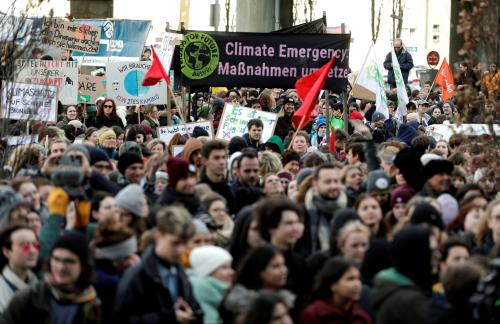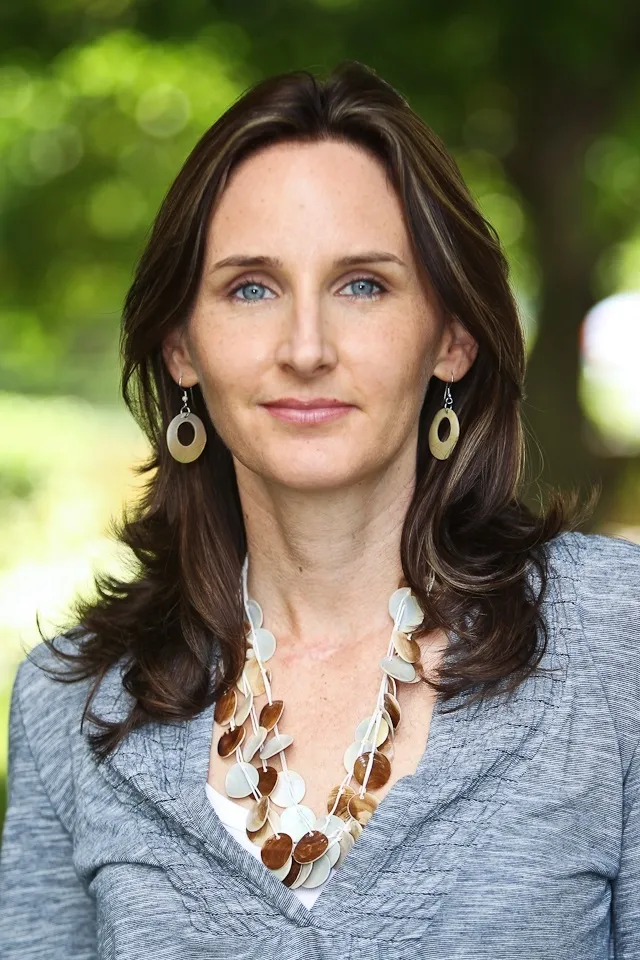2020 is already shaping up to be a tumultuous year with the assassination Iranian commander Qassem Soleimani, impeachment, and the coming 2020 presidential elections. Below, explore what our experts have identified as the biggest the stories policymakers should be paying attention to in 2020.
Related Content

January 7, 2020
Preventing “deaths of despair” through increased awareness and funding – Carol Graham
 The crisis of so-called “deaths of despair,” including suicides, opioid overdose, and alcohol related deaths, has taken 1 million lives since 2005. The latest numbers, for 2017, suggest a modest dip in some of these deaths, which are primarily concentrated among less-than-college-educated middle aged whites, but a new spread to older urban black men and to millennials and teens. Federal policy thus far has primarily focused on providing opioid antidotes to prevent deaths among addicts, while not dealing with the demand side of the crisis: widespread despair among significant sectors of the population due to loss of steady employment and other purposeful activity. There are myriad local efforts, though, to increase resilience and well-being among deprived communities. These efforts, which are key to reversing despair, need central level attention and financing to achieve a scale that is significant enough to prevent these deaths from spreading to the next generation.
The crisis of so-called “deaths of despair,” including suicides, opioid overdose, and alcohol related deaths, has taken 1 million lives since 2005. The latest numbers, for 2017, suggest a modest dip in some of these deaths, which are primarily concentrated among less-than-college-educated middle aged whites, but a new spread to older urban black men and to millennials and teens. Federal policy thus far has primarily focused on providing opioid antidotes to prevent deaths among addicts, while not dealing with the demand side of the crisis: widespread despair among significant sectors of the population due to loss of steady employment and other purposeful activity. There are myriad local efforts, though, to increase resilience and well-being among deprived communities. These efforts, which are key to reversing despair, need central level attention and financing to achieve a scale that is significant enough to prevent these deaths from spreading to the next generation.
Carol Graham
Leo Pasvolsky Senior Fellow and Research Director, Global Economy and Development
Legitimizing Saudi Arabia at the G20 in spite of hostile actions in the region – Bruce Riedel
 The Kingdom of Saudi Arabia will host the next summit of the G20 in Riyadh just after the U.S. presidential election in November 2020. World leaders will have to decide whether to boost the legitimacy and prestige of the Saudi hosts, especially Crown Prince Mohammed bin Salman, by attending. President Trump will attend—he has whitewashed the Crown Prince’s role in the murder of Jamal Khashoggi and is an enthusiastic supporter of the Saudi war in Yemen and its hostility with Iran. Russian President Vladimir Putin will go too. It will fall to others to distance their countries. If the Democrats have won the election they certainly will express disapproval: Joe Biden for example has said the Kingdom should be treated as a pariah.
The Kingdom of Saudi Arabia will host the next summit of the G20 in Riyadh just after the U.S. presidential election in November 2020. World leaders will have to decide whether to boost the legitimacy and prestige of the Saudi hosts, especially Crown Prince Mohammed bin Salman, by attending. President Trump will attend—he has whitewashed the Crown Prince’s role in the murder of Jamal Khashoggi and is an enthusiastic supporter of the Saudi war in Yemen and its hostility with Iran. Russian President Vladimir Putin will go too. It will fall to others to distance their countries. If the Democrats have won the election they certainly will express disapproval: Joe Biden for example has said the Kingdom should be treated as a pariah.
Bruce Riedel
Senior Fellow, Foreign Policy
Combat income inequality by enacting real time payments – Aaron Klein
 America’s payment system has become a hidden driver of income inequality. The rich get richer through tax-free “rewards” every time they swipe luxury credit cards offered only to the highest earners. The poor get poorer through overdrafts, payday loans, and check cashing fees necessary only because banks are allowed to hold onto customers’ funds for 3 to 6 days, a practice much of the world has eliminated by adopting real time payments.
America’s payment system has become a hidden driver of income inequality. The rich get richer through tax-free “rewards” every time they swipe luxury credit cards offered only to the highest earners. The poor get poorer through overdrafts, payday loans, and check cashing fees necessary only because banks are allowed to hold onto customers’ funds for 3 to 6 days, a practice much of the world has eliminated by adopting real time payments.
Aaron Klein
Fellow, Economic Studies
Voter turnout in 2020 will effect education reform – Jon Valant
 Education policy discussions in 2020 will focus on issues that arise in the presidential campaign. These includes big, important topics that have already arisen in the Democratic race—college affordability, charter schools, teacher pay, and more. The reality, though, is that most education policymaking happens at the state and local levels. One way or another, turnout in this presidential election will shape down-ballot races at those levels. The outcomes of those races will have real implications for an assortment of issues, including early childhood education, education finance (including teacher pay), and school safety.
Education policy discussions in 2020 will focus on issues that arise in the presidential campaign. These includes big, important topics that have already arisen in the Democratic race—college affordability, charter schools, teacher pay, and more. The reality, though, is that most education policymaking happens at the state and local levels. One way or another, turnout in this presidential election will shape down-ballot races at those levels. The outcomes of those races will have real implications for an assortment of issues, including early childhood education, education finance (including teacher pay), and school safety.
Jon Valant
Fellow, Economic Studies
Data analysis will drive progress toward achieving Sustainable Development Goals – Emily Gustafsson-Wright
 Data plays a starring role in outcome-based financing. Governments and donors want resources to achieve impact, and tying financing to outcomes can direct funds toward effective interventions and providers. Our global research on impact bonds, a type of outcome-based financing, emphasizes the importance of data. Whether analyzing evidence across Latin America or on education outcomes in India, our research highlights the need for better data on real-time performance, results, cost, and the cost of inaction. We look forward to more discussions in 2020 around how to build capacity to collect and use data effectively, to drive progress toward the Sustainable Development Goals.
Data plays a starring role in outcome-based financing. Governments and donors want resources to achieve impact, and tying financing to outcomes can direct funds toward effective interventions and providers. Our global research on impact bonds, a type of outcome-based financing, emphasizes the importance of data. Whether analyzing evidence across Latin America or on education outcomes in India, our research highlights the need for better data on real-time performance, results, cost, and the cost of inaction. We look forward to more discussions in 2020 around how to build capacity to collect and use data effectively, to drive progress toward the Sustainable Development Goals.
Emily Gustafsson-Wright
Fellow, Global Economy and Development
The benefits of developing commercial nuclear reactors in the Arab world – David G. Victor
 Abu Dhabi’s plan to load fuel into its Barakah nuclear complex in February could lead to full power commercial operations a year or so later. This is the first commercial reactor in the Arab world and is the most interesting nuclear project on the planet today. Done well, it becomes the model for the region and for export of commercial reactors to countries that are new to nuclear power. And the quantity of carbon it will reduce—by displacing oil-fired electricity and gas-fired power—will be astronomical.
Abu Dhabi’s plan to load fuel into its Barakah nuclear complex in February could lead to full power commercial operations a year or so later. This is the first commercial reactor in the Arab world and is the most interesting nuclear project on the planet today. Done well, it becomes the model for the region and for export of commercial reactors to countries that are new to nuclear power. And the quantity of carbon it will reduce—by displacing oil-fired electricity and gas-fired power—will be astronomical.
David G. Victor
Co-Chair, Cross-Brookings Initiative on Energy and Climate
Enacting Short-Time Compensation will reskill workers for the future – Annelies Goger
 I urge policymakers to consider Short-Time Compensation (STC) as a “future of work” policy solution in 2020. STC, also called “shared work,” enables employers who face decreased demand to reduce employee hours rather than eliminate jobs. Employees receive unemployment insurance benefits for lost hours, providing them income support and time to refresh their skills. As demonstrated in Germany through Kurzarbeit, STC is a powerful tool for minimizing displacement, enhancing competitiveness, and improving retention and morale through recessions. Only some U.S. states have STC, and awareness tends to be low. Before a recession is the best time for taking action.
I urge policymakers to consider Short-Time Compensation (STC) as a “future of work” policy solution in 2020. STC, also called “shared work,” enables employers who face decreased demand to reduce employee hours rather than eliminate jobs. Employees receive unemployment insurance benefits for lost hours, providing them income support and time to refresh their skills. As demonstrated in Germany through Kurzarbeit, STC is a powerful tool for minimizing displacement, enhancing competitiveness, and improving retention and morale through recessions. Only some U.S. states have STC, and awareness tends to be low. Before a recession is the best time for taking action.
Annelies Goger
David M. Rubenstein Fellow, Metropolitan Policy Program
Supporting equitable apprenticeships requires the development of state-level policies – Annelies Goger
 Staying innovative requires workplaces to become learning organizations. Apprenticeship can help deliver a more equitable, future-ready society. However, although they receive plenty of policy attention, the focus has largely been on building one-off, separate programs for each employer and creating numerous regional pilots. In the long run, it will be challenging for apprenticeships in non-traditional industries to scale without clarifying what state-level policy infrastructure is needed to support it. International promising practices suggest that equitable apprenticeship systems balance being employer-driven and student-centered. They tend to have well-aligned education and training policies and institutions with stable funding streams to support coordination.
Staying innovative requires workplaces to become learning organizations. Apprenticeship can help deliver a more equitable, future-ready society. However, although they receive plenty of policy attention, the focus has largely been on building one-off, separate programs for each employer and creating numerous regional pilots. In the long run, it will be challenging for apprenticeships in non-traditional industries to scale without clarifying what state-level policy infrastructure is needed to support it. International promising practices suggest that equitable apprenticeship systems balance being employer-driven and student-centered. They tend to have well-aligned education and training policies and institutions with stable funding streams to support coordination.
Annelies Goger
David M. Rubenstein Fellow, Metropolitan Policy Program
What it means to have a healthy economy – Martha Ross
 We need to overhaul how we support workers and rethink what a healthy economy looks like. More than 40 percent of workers are in low-wage jobs, and most are adults in their prime working years—not teens out for extra cash. Low unemployment does not translate into well-being if jobs don’t pay enough to live on. The safety net, systems to support career transitions, and job quality are all key issues.
We need to overhaul how we support workers and rethink what a healthy economy looks like. More than 40 percent of workers are in low-wage jobs, and most are adults in their prime working years—not teens out for extra cash. Low unemployment does not translate into well-being if jobs don’t pay enough to live on. The safety net, systems to support career transitions, and job quality are all key issues.
Martha Ross
Fellow, Metropolitan Policy Program
Strengthen unemployment policies while the economy is strong – Ryan Nunn
 During good economic times, policymakers have an opportunity to strengthen our policies before they are stressed during a recession. Unemployment insurance (UI) is a great example. It falls short of what it could accomplish, both as an automatic stabilizer and as a program that protects individual workers.
A recent proposal from Gabriel Chodorow-Reich and John Coglianese would help UI combat the next recession with better-timed extended benefits and other improvements. And David Ratner and I explore ways to strengthen UI generally, focusing on enhanced eligibility and careful design of experience-rated taxes.
During good economic times, policymakers have an opportunity to strengthen our policies before they are stressed during a recession. Unemployment insurance (UI) is a great example. It falls short of what it could accomplish, both as an automatic stabilizer and as a program that protects individual workers.
A recent proposal from Gabriel Chodorow-Reich and John Coglianese would help UI combat the next recession with better-timed extended benefits and other improvements. And David Ratner and I explore ways to strengthen UI generally, focusing on enhanced eligibility and careful design of experience-rated taxes.
Ryan Nunn
Fellow, Economic Studies
The importance and influence of China’s middle class on U.S-China relations – Cheng Li
 The current strategic discourse in Washington regarding the perceived “China threat” has barely considered the dynamic and intriguing role of the Chinese middle class in the bilateral relationship. Members of this group are keenly aware of two major events from the 1990s, namely Japan’s “lost decade” of economic growth and the collapse of the Soviet Union. They largely believe the Chinese official line that both episodes were products of an American conspiracy. Is it desirable—or even feasible—in a 21st century world driven by connectivity, for the two largest middle-class countries to be on a confrontational course?
The current strategic discourse in Washington regarding the perceived “China threat” has barely considered the dynamic and intriguing role of the Chinese middle class in the bilateral relationship. Members of this group are keenly aware of two major events from the 1990s, namely Japan’s “lost decade” of economic growth and the collapse of the Soviet Union. They largely believe the Chinese official line that both episodes were products of an American conspiracy. Is it desirable—or even feasible—in a 21st century world driven by connectivity, for the two largest middle-class countries to be on a confrontational course?
Cheng Li
Senior Fellow,Foreign Policy
Decrease political polarization by empowering the state as a force for public good – Constanze Stelzenmüller
 I think it’s time for a renaissance of the state as a guardian of public goods—locally, nationally, and internationally. States remain the key units of accountability, but we’ve let them degrade and fall into disrepair, assuming that markets and civil societies would pick up the slack. We’re paying the price in the form of popular anger and polarized politics.
I think it’s time for a renaissance of the state as a guardian of public goods—locally, nationally, and internationally. States remain the key units of accountability, but we’ve let them degrade and fall into disrepair, assuming that markets and civil societies would pick up the slack. We’re paying the price in the form of popular anger and polarized politics.
Constanze Stelzenmüller
Senior Fellow, Foreign Policy
The Brookings Institution is committed to quality, independence, and impact.
We are supported by a diverse array of funders. In line with our values and policies, each Brookings publication represents the sole views of its author(s).
